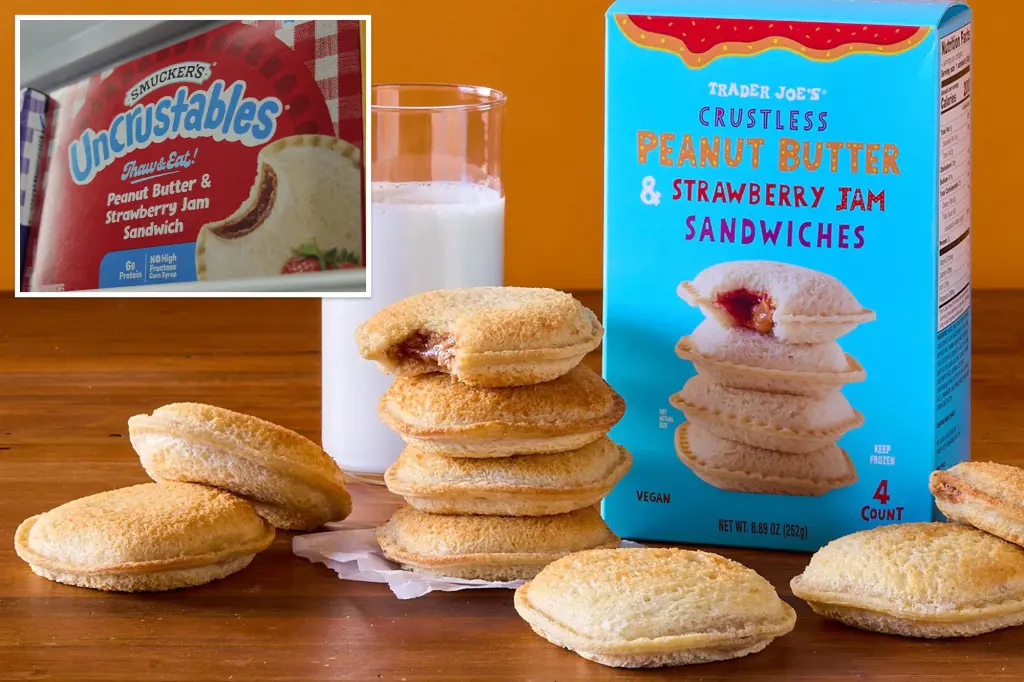Smucker Takes on Trader Joe’s: The Battle of the Crustless Sandwiches
In a surprising turn of events in the food industry, The J.M. Smucker Co. has initiated legal action against popular grocery chain Trader Joe’s, claiming that their new frozen peanut butter and jelly sandwiches bear too close a resemblance to Smucker’s beloved Uncrustables. Filed in federal court in Ohio on Monday, the lawsuit centers on what might seem like minor details to the casual observer: the round shape, the crimped edges, the blue packaging, and even the bite mark shown on the product imagery. But for Smucker, these elements represent more than two decades of brand development and over a billion dollars in investment. The Ohio-based food giant isn’t opposed to competition in the frozen sandwich market, they clarify, but they draw the line at what they perceive as intellectual property infringement. This case highlights the delicate balance between market competition and trademark protection in the food industry, where product presentation can be as valuable as the recipe itself.
The story of Uncrustables began modestly in 1996 in Fergus Falls, Minnesota, where two friends created the concept of sealed, crustless sandwiches. Recognizing the product’s potential, Smucker acquired their company in 1998 and secured patents for the “sealed, crustless sandwich” the following year. However, the journey from concept to grocery store success wasn’t straightforward. Mass production presented significant challenges, requiring Smucker to invest heavily in research and development. According to their lawsuit, the company has poured over $1 billion into developing the Uncrustables brand over the past two decades. This investment included perfecting the distinctive stretchy bread that consumers have come to associate with the product and expanding the flavor range beyond the traditional peanut butter and jelly to include options like chocolate and hazelnut. This history of innovation and financial commitment forms the backbone of Smucker’s current legal argument.
The specific complaints laid out in Smucker’s lawsuit focus on several design elements they believe Trader Joe’s has appropriated. Chief among these is the distinctive crimped edge that gives both products their pie-like appearance. Smucker claims this design feature is covered by their trademarks and is immediately recognizable to consumers as an Uncrustables characteristic. The packaging is another point of contention, with Smucker arguing that Trader Joe’s use of a similar blue color scheme to the “Uncrustables” lettering on their own packages creates market confusion. Perhaps most specifically, Smucker points to the imagery on Trader Joe’s boxes, which shows a sandwich with a bite taken out of it – remarkably similar to how Uncrustables are presented in their marketing materials. These similarities, according to Smucker, aren’t coincidental but represent a deliberate attempt to capitalize on the established Uncrustables brand identity.
The lawsuit alleges that customer confusion is already occurring as a result of these similarities. As evidence, Smucker included in their filing a social media post showing a consumer who believed Trader Joe’s sandwiches were actually manufactured by Smucker under a private label arrangement. This misconception goes to the heart of trademark law, which aims to prevent consumers from being misled about the source or quality of products they purchase. For Smucker, this confusion represents not just a potential loss of sales but a dilution of their brand value and the significant investment they’ve made in building consumer trust and recognition. Trader Joe’s, known for its unique product offerings and loyal customer base, has yet to respond publicly to the allegations, leaving food industry watchers and legal experts speculating about how this battle between two beloved brands might unfold.
This isn’t the first time Smucker has taken action to defend what it sees as infringement on its Uncrustables intellectual property. In 2022, the company sent a cease and desist letter to Gallant Tiger, a Minnesota-based company that was producing what it described as upscale versions of crustless peanut butter and jelly sandwiches with crimped edges. The current case against a major retailer like Trader Joe’s, however, represents a significant escalation in Smucker’s enforcement efforts and could have broader implications for the food industry. It also comes amid a larger trend of major food manufacturers taking legal action against retailers over store-brand products that they believe too closely mimic their established brands. Just months ago, Mondelez International filed a similar lawsuit against Aldi, claiming that the discount grocer’s private-label cookies and crackers used packaging too similar to Mondelez brands including Chips Ahoy, Wheat Thins, and Oreos.
The Smucker versus Trader Joe’s case touches on fundamental questions about innovation, imitation, and the boundaries of intellectual property in the food industry. While patent protections for food products are typically difficult to maintain long-term, trademark protections for distinctive design elements and packaging can provide companies with more durable competitive advantages. For consumers, these legal battles might seem remote from their daily experience of simply enjoying a convenient, crustless sandwich, but they ultimately shape what products appear on store shelves and how they’re presented. As the case proceeds through the legal system, it will test the strength of Smucker’s trademark claims against Trader Joe’s right to compete in the frozen sandwich category. The outcome could influence how other food manufacturers and retailers approach the development of competing or similar products, potentially affecting everything from product design to packaging choices across the industry.















